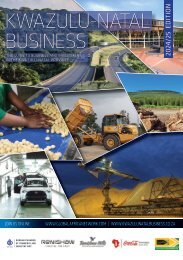KwaZulu-Natal Business 2016-17 edition
The 2016-17 edition of KwaZulu-Natal Business is the eighth issue of this highly successful publication that, since its launch in 2008, has established itself as the premier business and investment guide to the KwaZulu-Natal province in South Africa. The province is unique in terms of its abundant natural and human resources, and is also one of the key drivers behind the South African economy. To complement the extensive local, national and international distribution of the print edition of the magazine (15 000 copies), the full content can also be viewed online at www.kwazulunatalbusiness.co.za. Updated information on KwaZulu-Natal is also available through our monthly e-newsletter, which you can subscribe to online at www.globalafricanetwork.com, in addition to our other business-to-business titles that cover all nine provinces, complemented by our flagship publication, South African Business.
The 2016-17 edition of KwaZulu-Natal Business is the eighth issue of this highly successful publication that, since its launch in 2008, has established itself as the premier business and investment guide to the KwaZulu-Natal province in South Africa.
The province is unique in terms of its abundant natural and human resources, and is also one of the key drivers behind the South African economy.
To complement the extensive local, national and international distribution of the print edition of the magazine (15 000 copies), the full content can also be viewed online at www.kwazulunatalbusiness.co.za.
Updated information on KwaZulu-Natal is also available through our monthly e-newsletter, which you can subscribe to online at www.globalafricanetwork.com, in addition to our other business-to-business titles that cover all nine provinces, complemented by our flagship publication, South African Business.
Create successful ePaper yourself
Turn your PDF publications into a flip-book with our unique Google optimized e-Paper software.
SPECIAL FEATURE<br />
In a year that saw world economic and political<br />
uncertainty, South Africans still had much cause to<br />
celebrate. Great strides have been made nationwide<br />
in building schools and hospitals, major efforts are<br />
underway in terms of job creation, skills development,<br />
SMME growth, the empowerment of women as well<br />
as innovation. After a tough period of loadshedding<br />
and energy instability, Eskom seems to have the<br />
national grid stabilised as well as solid plans for the<br />
expansion of our infrastructure.<br />
South Africa also hit the world headlines through<br />
the discovery of a new species of human relative<br />
("Homo naledi") at the Cradle of Humankind<br />
World Heritage Site, a local doctor successfully<br />
completed the world’s first penis transplant, and<br />
Trevor Noah captured a slice of America’s cultural<br />
empire by taking over as host of Comedy<br />
Central’s The Daily Show.<br />
National priorities<br />
In his State of the Nation Address in early 2015,<br />
President Jacob Zuma said that it had been the<br />
year of rededicating ourselves to eradicate racism<br />
and all related intolerances in our country.<br />
Zuma added that the country’s ambition of<br />
achieving a growth target of 5% by 2019 is at risk<br />
because of slow global growth as well as domestic<br />
constraints in energy, skills, transport and logistics<br />
amongst other factors. However, the situation<br />
was more promising on the jobs front as Statistics<br />
South Africa’s report on the last quarter of 2014<br />
showed that there are now 15.3-million people<br />
who are employed in South Africa. "Jobs grew by<br />
203 000," said Zuma, adding that the economy<br />
still needed a major push forward. Zuma also presented<br />
government’s nine-point plan to ignite<br />
growth and create jobs.<br />
National Government’s nine-point growth plan<br />
1. Resolving the energy challenge.<br />
2. Revitalising agriculture and the agro-processing<br />
value chain.<br />
3. Advancing beneficiation or adding value to our<br />
mineral wealth.<br />
4. More effective implementation of a higher impact<br />
Industrial Policy Action Plan.<br />
5. Encouraging private sector investment.<br />
6. Moderating workplace conflict.<br />
7. Unlocking the potential of small, medium and micro<br />
enterprises (SMMEs), co-operatives, township and<br />
rural enterprises.<br />
8. State reform and boosting the role of state-owned<br />
companies, information and communications technology<br />
(ICT) infrastructure or broadband roll-out,<br />
water, sanitation and transport infrastructure.<br />
9. Operation Phakisa, which is aimed at growing the<br />
ocean economy and other sectors.<br />
"A lot has been achieved in the past year. We believe<br />
that our nine-point economic intervention plan on<br />
the economy will consolidate the achievements,<br />
and ignite much-needed growth," said Zuma.<br />
South Africa has the 24th largest economy in<br />
the world and contributes 30% of Sub-Saharan<br />
GDP despite having only 6.5% of the population.<br />
Sound financial management has seen South<br />
Africa’s macro-economic fundamentals become<br />
very strong off the shaky base that the apartheid regime<br />
created. In particular, prudent controls meant<br />
that South Africa was able to withstand the shockwaves<br />
sent around the world by the international<br />
financial-sector meltdown.<br />
The country is renowned for an abundance<br />
of mineral resources, accounting for a significant<br />
proportion of both world production and<br />
reserves, and South African mining companies<br />
dominate many sectors in the global industry.<br />
South Africa produces 10% of the world’s gold (it<br />
is estimated that about one-third of the world’s<br />
unmined gold still remains in South Africa) and<br />
there has been an increase in the beneficiated<br />
minerals industry, which the government has<br />
targeted as a growth sector.<br />
Economy<br />
The discovery of diamonds and gold in the 19th<br />
century laid the platform for the development of<br />
South Africa as an industrialised economy. Wool,<br />
wine and mohair were the country’s only exports<br />
before minerals were discovered.<br />
55 KWAZULU-NATAL BUSINESS <strong>2016</strong>/<strong>17</strong>


















